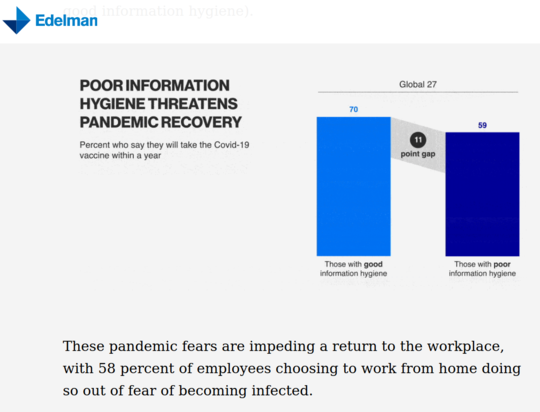Information hygiene
(Self-censorship) | |
|---|---|
 A diagram from Edelman illustrating the concept of "information hygiene" in practice | |
| A scientific-sounding buzzword being promoted as part of the SDS internet censorship project. Information hygiene is a mix of censorship through "fact checkers" and "technological solutions", and attempting to get the population to self censor and instead "trust the experts". |
"Information hygiene" is a scientific-sounding buzzword being promoted as part of the SDS internet censorship project. Information hygiene is a mix of censorship through "fact checkers" and "technological solutions"[1], and attempting to get the population to self censor and instead "trust the experts".[2]
Problems with term
The concept has an strong tinge of projection, as the official narrative itself more often than not contains a large amount of misinformation and is often spread without assessing its validity. For example, the WHO wrote:
But just as we can protect against COVID-19 with hand washing, physical distancing and masks, we can slow down the spread of misinformation and disinformation by practising some information hygiene.[3]
Business meaning
The concept was used in business studies before the censorship industry latched on to it: "Data minimization and the routine, defensible disposition of data are essential to maintaining an organization’s information hygiene. Some types of data are useful for only a short amount of time, while others, such as certain vital corporate records, may have a nearly infinite useful life. The likelihood that an organization will access aging data decreases exponentially over time, and the vast majority of data eventually reaches a point where it no longer has business value. The data eventually becomes digital debris, which industry experts commonly refer to as redundant, obsolete, or trivial data.[4]"
Censorship dreams
During Covid, Dr. David Robert Grimes wrote: "Long term, the only lasting vaccine against this onslaught of poisonous fictions is to improve our societal critical-thinking skills. If there is a silver-lining to COVID-19, it might be that it has focused the world's attention upon the vital importance of physical hygiene. The importance of rigorous hand-washing and social distancing to stem the tide of the virus is something we collectively understand. But in tandem with this, we need to recognise that health disinformation goes viral too and does serious harm. If we are to protect ourselves against the ramifications of these rapidly increasing fictions, we must practice a new protective measure, a form of Informational Hygiene. Rather than risk unprotected exposure, we need to recognise that a healthy scepticism is our best protection against damaging fictions about our health. We must recognise that exposure to misinformation is harmful, take precautions to prevent ourselves becoming infected, and avoid vectors of misinformation in the sound and fury of bogus health claims. Regulation of social media is a solution which must be seriously considered..."[5]
References
- ↑ https://ieeexplore.ieee.org/document/9770460
- ↑ https://www.bbc.com/news/blogs-trending-51967889
- ↑ https://www.who.int/news-room/spotlight/let-s-flatten-the-infodemic-curve
- ↑ https://www.reuters.com/practical-law-the-journal/litigation/data-minimization-avoid-over-retention-personal-information-2023-03-01/
- ↑ https://www.embopress.org/doi/full/10.15252/embr.202051819